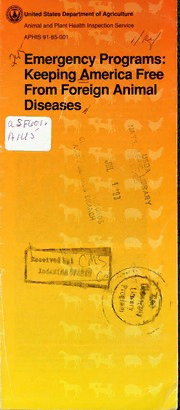
Emergency programs : keeping America free from foreign animal diseases PDF
Preview Emergency programs : keeping America free from foreign animal diseases
Historic, archived document Do not assume content reflects current scientific knowledge, policies, or practices i^y|United States DepartmentofAgriculture Animal and Plant Health Inspection Service APHIS 91-85-001 %. y g^mergency Programs: KeepingAmerica Free From Foreign Animal Disea5>es v Emergency Programs: Keeping America Free From Foreign Animal Diseases An outbreak of a foreign animal disease in the United States could seriously damage the domestic livestock and poultry industries. In the past, infections like foot-and-mouth disease and exotic Newcastle disease have resulted in millions of dollars in losses to producers. Keeping these sehous animal diseases out ofthe United States is the responsibility ofthe Animal and Plant Health Inspection Service's (APHIS) Veterinary Services (VS) unit. Within VS, the Emergency Programs staffcoordinates effortsto prepare forand respond to outbreaks of exotic animal diseases. We must protect our$80 billion livestock and poultry industries, which supply this country'sfood and fiberand generate significant export products. In 1983-84, the Emergency Programs staff coordinated the elimination ofan outbreak of highly pathogenic avian influenzafrom U.S. poultryflocks in the Northeast. Emergency Programs VS' Emergency Programs staff monitors foreign animal health and maintains an intensive surveillance system aimed at rapidly detecting and diagnosing outbreaks of exotic diseases in the United States. The staff is assisted in its efforts by Federal and State field veterinanans, animal health technicians, and disease specialists. The Emergency Programs staff also enlists the help of more than 40.000 federally accredited veterinarians from the phvate sector who assist with disease exclusion and control. Additionally. Veterinary Services keeps a watchful eye on U.S. borders, which could be breached by foreign animal diseases. Emergency Programs provides laboratory support in determining ifanimals suspected of harboring foreign diseasesare actually infected. Here, chick embryosare inoculated with material from birdsthought to have exotic Newcastle disease. Mission Emergency Programs provides expertise on exotic animal diseases, ensures adequate disease surveillance within the United States, maintains a high level of emergency preparedness, and provides the needed resources to respond and eliminate disease outbreaks in the United States and itsterritories. History In 1971, priorto the development ofthe Emergency Programs unit, an outbreak of Venezuelan equine encephalomyelitis (aform of horse sleeping sickness) entered the United States from Mexico. Swift response by a taskforce ofVS and State personnel prevented a widespread outbreak ofthe disease. This outbreak, coupled with an outbreak ofexotic Newcastle disease in southern Californiathe next year, led tothe creation ofthe Emergency Programs unit in 1972. Since its formation, Emergency Programs has successfully carried out eradication campaigns against sheep scabies (1973), exotic Newcastle disease (1974), hog cholera (1978), and avian influenza (1984). Support Services Emergency Programs providestraining to Federal and State veterinarians, diagnosticians, animal health technicians, epidemiologists, portveterinarians, foreign Exotic diseasesthatthreaten the U.S. poultry industrycan enterthecountrywhen pet birds are imported illegally. APHIS personnel band imported birds beforetheir releasefrom quarantinesotheycan be traced in commerce. When practicing veterinanans identifya possible incidence offoreign animal disease and report itto APHIS, Emergency Programs staffers workwith them to make a definitive diagnosis. This parrot did not have exotic Newcastle disease. veterinary medical officers, VS program specialists, and others whose responsibilities require knowledge offoreign animal disease diagnosis and identification. In the event of a foreign animal disease outbreak, these trained professionals would be called upon to help prevent the spread ofthe disease. Each year, four regional task forces receive emergency response training. Known as the Regional Emergency Animal Disease Eradication Organization (READEO), these task forces consist of APHIS-VS employees, State veterinarians, military support personnel, industry liaisons, and representatives from other units within VS, APHIS, and the U.S. Department of Agriculture (USDA). Emergency Programs also conducts foreign animal disease training courses at its headquarters in Hyattsville, MD, at the National Veterinary Services Laboratory in Ames, lA, and at the Foreign Animal Disease Diagnostic Laboratory in Plum Island, NY. Practicing veterinarians and ranchersand farmers arethefirst line ofdefense in reporting suspected casesofforeign animal disease. Information Resources When adisease emergency is declared, prompt accessto current scientific information is essential. Through its Animal Disease Management Information Center (ADMIC), Emergency Programs is able to access relevant literature about livestock and poultry diseases. This computerized information system, used by professionals associated with animal disease prevention, contains morethan 75,000 articles and is updated annually. In addition to ADMIC, Emergency Programs maintains a lending library of more than 5,000 colorslides. These slides provide vivid photographs offoreign animal diseases and VS-related subjects. Emergency Programs also has a variety of instructional videotapes dealing with several subjects, including differential diagnosis, pathogenesis, and biosecurity. The rapid application ofvaccinesfor Venezuelan equine encephalomyelitis by practicing veterinarians was critical in eliminating the 1971 outbreak ofthis disease in the United States. Morethan 300trained State and Federal foreign animal diseasediagnosticians are strategically locatedto investigate suspected casesofexoticdisease. During APHIS' hog choleraeradication program, tonsil biopsies fromthousandsofswinewere obtainedtotrace the progress ofthe epidemic. Focus on the Future In orderto effectively preventfuture foreign animal disease outbreaks, Emergency Programs needsthe help of veterinarians, livestock producers, and State and local governments. By maintaining a unified effort, this country can meetthe challenge of preventing and/oreliminating exoticdisease outbreaks. Emergency Programs will continue to ensurethatdisease surveillance and detection efforts are maintained by providing the expertise to rapidly detect and eliminate foreign animal disease outbreaks. What You Can Do To Help Informed veterinarians and livestock producers are the first line ofdefense againstforeign animal diseases. Fact sheets, brochures, and printed program aids are available fordistribution to interested individuals and groups. To obtain program materials, contact: USDA-APHIS-VS-Emergency Programs Room 741, Federal Building 6505 Belcrest Road Hyattsville, MD 20782 Telephone (301) 436-8073 Theprogramsofthe U.S. DepartmentofAgricultureareavailable toanyonewithout regardto race, creed, color, gender, disability, religion, riatio'nal origin, orpolitical belief. Issued November 1992
